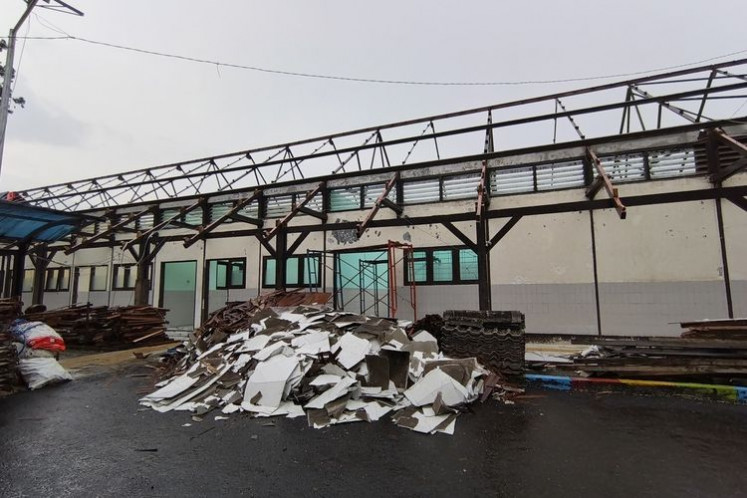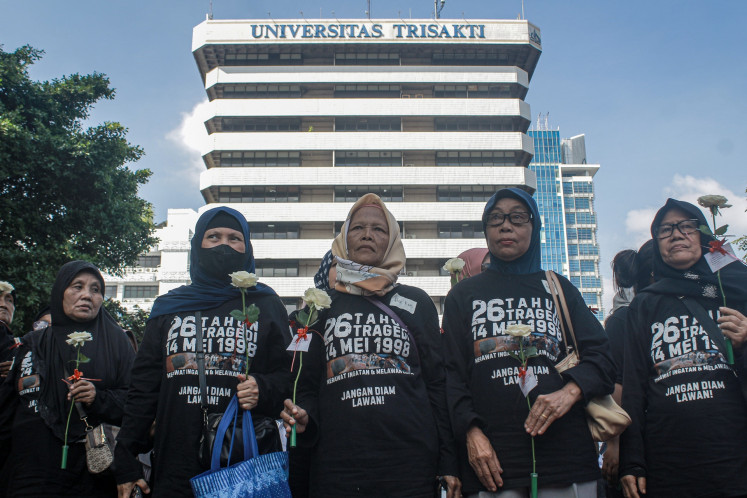People will do the craziest things to get home for Lebaran
Hours of traffic hardship and ordeal seem to be nothing for millions of people who want to share the post-ramadhan celebration of Idul Fitri — locally known as Lebaran —in their respective hometowns with their loved ones
Change text size
Gift Premium Articles
to Anyone

H
ours of traffic hardship and ordeal seem to be nothing for millions of people who want to share the post-ramadhan celebration of Idul Fitri — locally known as Lebaran —in their respective hometowns with their loved ones.
They do not bother if they have to travel for tens of hours and fight for tickets just to be able to gather with their parents, relatives and old friends for Lebaran.
In Tanjung Mas Seaport in Semarang, Central Java, parents carrying heavy luggage while taking their kids with them have been daily scenes for the last few days.
One of them was Bagyo Suharjo, an exodus traveler from Maro, West Kalimantan, who arrived at the port on Wednesday on board of KM Egon ship.
“We have travelled for 30 hours from Maro to Semarang,” said Bagyo, who would further travel to Surakarta, Central Java, and to Tulungagung, East Java, together with five other members of his family.
This meant that they still needed to spend even more hours to get to their final destination. Yet, no complaint was heard from any family member.
Fatigue, Bagyo said, was just normal. “It disappears once we meet other family members,” he said.
The same experience was shared by Ahmad Sobirin of Demak, Central Java, who currently resides in West Kotawaringin, Pangkalan Bun, Central Kalimantan.
He and his wife and two daughters had to spend 20 hours to get to their hometown, but they have never missed travelling home for Lebaran for a single year.
“At least I can share a bit of my good fortune with family members back home,” said Ahmad.
The same thing has also been a tradition for Sutardi, 40, as he has to leave his wife Suwanti, 40, in their hometown in Klaten, Central Java, while he works in Sunter, North Jakarta, as a public transportation driver.
“Lebaran without mudik is like side dishes without salt. It’s tasteless. Lebaran is an obligation for me to be with my family,” said Sutardi, referring to the local term of traveling home to celebrate Idul Fitri.
He had just arrived in his village on Wednesday morning, after spending some 18 hours on a minibus that he jointly rented with friends for the exodus.
“The fee is twice as much as a bus ticket, but I didn’t see any other way of getting here,” said Sutardi, who blamed himself for his lack of preparation for the exodus in that he failed to get a bus ticket which normally cost him only Rp 200,000.
Suratmi, 45, who currently resides in Bekasi and on her mudik way to Wonogiri, Central Java, said she always made preparations well in advance for leaving to her hometown to celebrate Idul Fitri.
“I have had my bus ticket reserved since the first week of Ramadhan,” she said.
She said good preparation was the key for more comfortable travel so that she could meet her relatives in a better condition.
In a related development, thousands of exodus travelers were seen trapped in casual roadside market areas along the north coast’s Indramayu-Cirebon route in West Java. Traffic congestion could be spotted in a number of places around Pasar Cilet and Pasar Losarang and traditional markets in Kandanghaur, Indramayu.
In Bandung, West Java, officials at bus terminals have been instructed to tightly monitor public vehicles to see if they are roadworthy and to check if drivers are in good health.
“We have to guarantee the people’s safety during the exodus,” Bandung Mayor Ayi Vivananda said visiting Cicaheum bus terminal on Wednesday.
He said the bus terminal officers had excluded 14 buses because they were considered unroadworthy.
Head of Cicaheum terminal, Jujun Juanda, said five drivers considered unfit to drive had also been banned from driving their buses. Three were because of high blood pressures and old age.
Two were under the influence of alcohol.
Nana Rukmana and Arya Dipa contributed to the story from Cirebon and Bandung.









